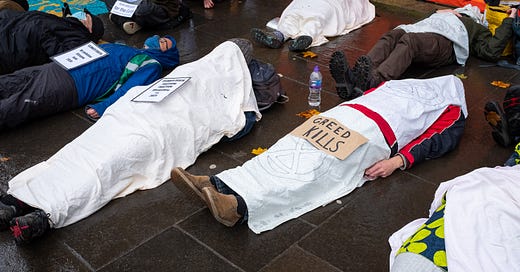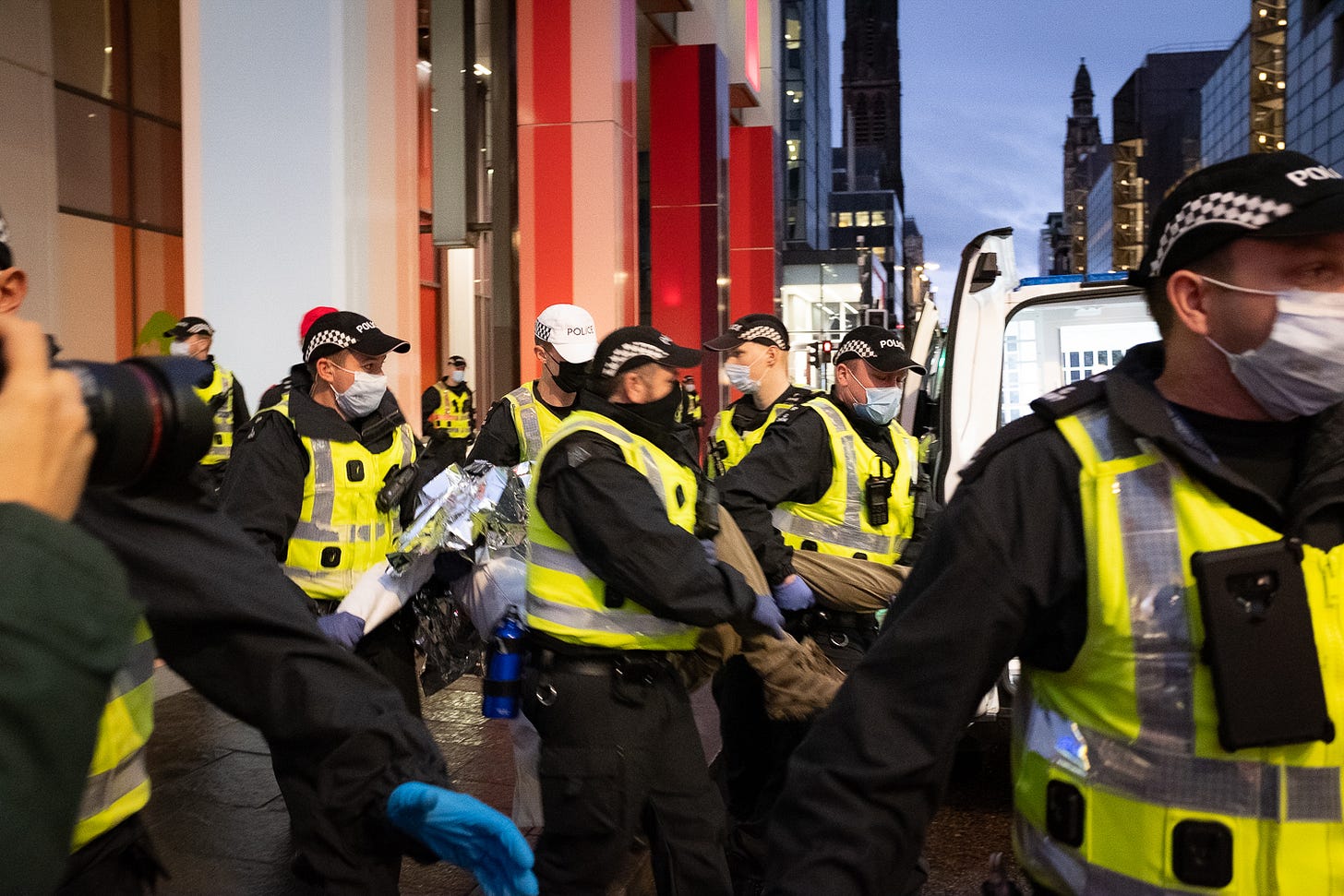I was hungover in Birmingham. It’s a great city, but it’s not a great place to be hungover. All that concrete. And being on the edge of a motorway in the middle of Birmingham is even worse. I felt like there was a grand piano lying on my head. Every lorry was like someone running down the keys.
Bee saved me. I got out of the gloom into the car and we slid out of the petrol station into the traffic, making our way through Birmingham’s monolithic towers. It was the first time I’d been to Birmingham and I liked it a lot. Most people I’ve met have had nothing good to say about it but they’re wrong.
Bee was with her daughter, Skye, who sat quietly on the backseat. They were on their way home from the Science Museum. Bee had had another baby and was worried Skye was feeling neglected so a trip to her old university town had been devised. The baby was with its father, a thought that made Bee mildly worried.
I didn’t have much energy but we talked all the same. It’s a bit rude to get in a stranger’s car and fall asleep I always think. I think they’d be a bit creeped out. I would. With hitchhiking, you’ve always got to be an ambassador since most people probably think you’re going to murder them. Plus Bee said she nearly didn’t pick me up because I was a bloke so I had to make a good impression. Chatting amiably it was.
Bee taught at a university. She felt very privileged to teach people. Bee was very aware of her privilege and she said so often. Her course was on sustainability, analysing how it exists within systems and how they can be manipulated to bring positive change. It was rewarding work.
Her personal research looked at injustices within the energy transition. Who’s going to be affected how and in what ways, who will be the winners and who the losers. Energy at peak times was her particular niche. There’s talk of making it more expensive to reduce people’s consumption between 5-7 o’clock. That’s when there’s most pressure on the grid.
The issue is, Bee explained, if you introduce a charge some people will get hit harder than others. Disabled people, the elderly, people with lots of kids. How do you cook your kids supper after school if you’re on the breadline already, that kind of thing. She was looking at the knock-on effects of the outwardly good policy ideas.
The inequalities of the climate crisis shouldn’t be contemplated when hungover. It’s an unpleasant subject. We contemplated them nonetheless.
Bee liked to remain positive. She said you have to. Many of her colleagues got too caught up in the doom of it all. It’s easy to do it, but it’s not worth it. You lose all your energy and become bitter and cynical. That’s no way to live. “Some of them are really depressed. They should go and be artists.”
Many say that climate anxiety should be used to spur you into action. "It’s an energy source,” I said, “If you suffer from it, trick is to harness it and go and be an activist or something.”
“Yeah sure,” Bee answered with a shrug, “I’ve got some mates who are glueing themselves to bridges and blocking motorways and stuff. We’ve actually kind of fallen out over it.”
“Why’s that?”
“Because…” she gathered her thoughts as the motorway rolled, “I think…since we’ve grown up we’ve always been told we can do anything we want. It’s kinda what our society’s built on. If you want to be a doctor, go and be a doctor! A lawyer, go and be one! Whatever it is we’re taught we can do it. So for some people with climate anxiety, it’s really hard to feel that there’s something that they can’t change as individuals. So they go and glue themselves to a bridge!”
We contemplated what she said and I thought it was quite profound. Bee went on. “It’s like Gandhi said, himself quite a controversial figure, but change what you can and don’t worry about what you can’t. It’s the individualism that drives it. Personal autonomy. Maybe in other parts of the world they don’t have the same sense.
“You know life is full of beauty and poetry and amazing things that you can enjoy. You yourself aren’t responsible for all this stuff that’s going on. Some of it is just happening and there’s not much you can do. So you’ve gotta enjoy yourself and your life. Of course, not just consuming and ignoring it, that’s stupid, but these friends will be like ‘Yeah… I’m gunna glue myself to a bridge and go to jail!’ What’s the point? What are you gunna do from jail? That feeling of power is quite a privileged thing to feel and I think a very white middle-class thing.”
At the time I agreed - I still didn’t have a great deal of cognitive capacity though I was feeling a bit better - but in hindsight, I realised it’s not entirely true.
I knew a man who sat outside parliament for 37 days without eating. Angus his name was and he was a nice guy. I’d go down and see him sitting there in a camp chair with his big sign and a bottle of water, maybe a cup of tea. As he went on he’d do less talking as he tried to conserve his energy. He didn’t have any kids himself but was doing it for his nephews and nieces. His big sign read UNCLE ON HUNGER STRIKE and he had a red coat and broad-rimmed hat. His friend Peter sat behind him helping out. Towards the end, Peter was doing all the talking. He was a big burley bloke with a bald head. He looked a bit like a bouncer and was very friendly. He told me a few tricks for how to get access to MPs should I ever need to.
Angus’ aim was to get the government to agree to a high-level climate briefing. They told me that when Boris heard this particular briefing he’d called it his “Road to Damascus” moment. If only they could tell all parliament the same thing, they too would have the same realisation. I thought they might have been misreading Boris’ intentions but 37 days later parliament agreed to the briefing. I don’t know what effect it had beyond that, but they agreed and that was something.
Nevertheless, I’ve seen plenty of less effective activism. I went and watched a ‘die-in’ once. A few dozen relatively old people lay outside a Scottish asset management firm and pretended to be dead. The reason for the outrage was seemingly sound. They’d discovered the firm had advised the government that 2°C warming is the ultimate temperature rise for profit. The COP conference up the road was all about keeping to 1.5°C so you can understand their frustration. Nevertheless, I doubt the employees were bothered by the kagooled crowd lying on their doorstep, but you never know.
I also saw a bunch of scientists throwing green paint on an oil company building. One of them glued himself to the floor outside it and it took the police nearly an hour to get him off and into the back of the van. “Exactly,” Bee said, “What’s he gunna do from prison?”
I told her about a climate scientist I’d spoken to once. She was called Dr Fredi Otto and she’d set up something called World Weather Attribution. The idea was that they could use data to accurately and rapidly explain the impact of climate change on extreme weather. A recent drought in Sudan for instance was shown to be nothing to do with climate change. It was just a drought that was likely to happen with or without. But the Vancouver heatwave that hit 50°C, that was only possible because of climate change. It’s a powerful tool, if anything, to make people wake up and smell the coffee. If they haven’t already.
Dr Otto and I had the same conversation, about climate anxiety and what we can do. “People should do what people feel they can do,” she’d advised, “For some that’ll be going on hunger strike. For others, it’ll be making their school eat a bit less meat. Whatever it is. We all have spheres of influence, some are bigger than others, but we all have one.”
Dr Otto explained that climate change is not a scientific issue it’s a social one. It’s a matter of resource allocation. The money’s there, it’s just in the wrong place. The old folks playing dead knew that. Canada could absorb that shock heatwave because it was wealthy enough. Sudan couldn’t absorb that drought, let alone one that’s caused by climate change. She said if we can prepare the countries worst affected we’ll be all right.
I told Bee this. She didn’t look convinced. “Hmm,” she replied, “Doesn’t matter how much preparation you do. There’s not much you can do if your country’s underwater…”
I began to feel hungover again.






